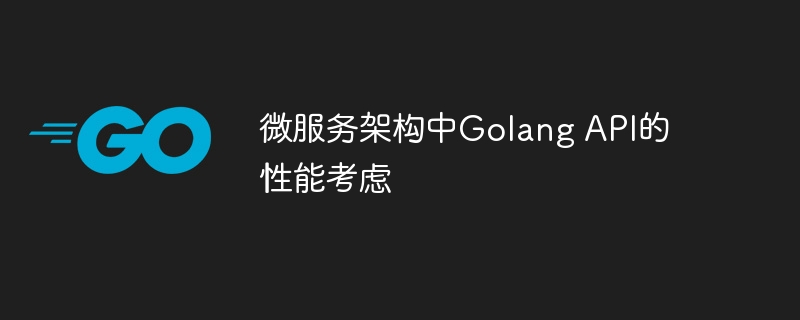微服务架构中Golang API的性能考虑
- WBOYWBOYWBOYWBOYWBOYWBOYWBOYWBOYWBOYWBOYWBOYWBOYWB原创
- 2024-05-07 18:36:011164浏览
为了优化 Go API 的性能,建议:1. 使用静态文件缓存机制;2. 采用分布式跟踪机制来追踪请求的处理过程,以便发现和解决性能瓶颈。这些技术可以有效减少延迟、提高吞吐量,从而提升微服务架构的整体性能和稳定性。

微服务架构中 Go API 的性能优化
引言
在微服务架构中,性能是至关重要的。本文将重点讨论如何通过各种技术优化 Go API 的性能,从而减少延迟并提高吞吐量。
代码示例
静态文件缓存
// ./handlers/cache.go
package handlers
import (
"net/http"
"time"
"github.com/go-cache/go-cache"
)
// Cache is an in-memory cache.
var Cache = cache.New(5*time.Minute, 10*time.Minute)
// CacheRequestHandler is a middleware that caches HTTP responses.
func CacheRequestHandler(next http.Handler) http.Handler {
return http.HandlerFunc(func(w http.ResponseWriter, r *http.Request) {
// Check if the response is already cached.
if cachedResponse, found := Cache.Get(r.URL.Path); found {
// If found, serve the cached response.
w.Write(cachedResponse.([]byte))
return
}
// If not found, call the next handler.
next.ServeHTTP(w, r)
// Cache the response for future requests.
Cache.Set(r.URL.Path, w, cache.DefaultExpiration)
})
}// ./main.go
package main
import (
"fmt"
"net/http"
"github.com/gorilla/mux"
"./handlers"
)
func main() {
r := mux.NewRouter()
// Add middleware to cache static file responses.
r.Use(handlers.CacheRequestHandler)
}分布式跟踪
// ./handlers/trace.go
package handlers
import (
"context"
"fmt"
"net/http"
"github.com/opentracing/opentracing-go"
"github.com/opentracing/opentracing-go/ext"
)
func TracesHandler(w http.ResponseWriter, r *http.Request) {
// Create a new span for this request.
span, ctx := opentracing.StartSpanFromContext(r.Context(), "traces")
// Add some tags to the span.
ext.HTTPMethod.Set(span, r.Method)
ext.HTTPUrl.Set(span, r.RequestURI)
// Simulate work being done.
fmt.Fprintln(w, "Hello, traces!")
// Finish the span.
span.Finish()
}// ./main.go
package main
import (
"fmt"
"net/http"
"github.com/gorilla/mux"
"github.com/opentracing/opentracing-go"
"github.com/uber/jaeger-client-go"
"github.com/uber/jaeger-client-go/config"
)
func main() {
// Configure and initialize Jaeger tracer.
cfg := &config.Configuration{
ServiceName: "go-api",
}
tracer, closer, err := cfg.NewTracer()
if err != nil {
panic(err)
}
defer closer.Close()
opentracing.SetGlobalTracer(tracer)
r := mux.NewRouter()
// Add route that uses tracing.
r.HandleFunc("/traces", handlers.TracesHandler)
}结论
通过实施这些性能优化技术,Go API 可以在微服务架构中高效运行,从而提高用户满意度和整体系统性能。
以上是微服务架构中Golang API的性能考虑的详细内容。更多信息请关注PHP中文网其他相关文章!
声明:
本文内容由网友自发贡献,版权归原作者所有,本站不承担相应法律责任。如您发现有涉嫌抄袭侵权的内容,请联系admin@php.cn

